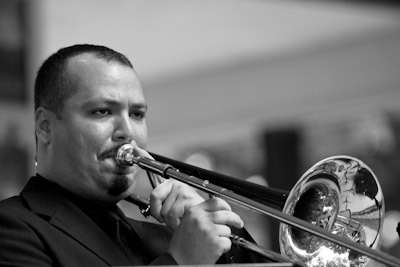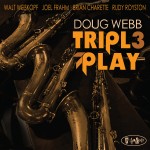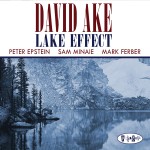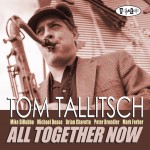Michael Dease – Decisions (Positone)

Julliard-educated and dapper in dress, trombonist Michael Dease is part of a vanguard of current jazz players that could be considered the latest iteration of the “young lions” ethos. Theirs is a time-tested musical blueprint that traces back through the Marsalises to the Fifties hardbop sound formed out of the work of icons on Dease’s instrument like J.J. Johnson and Curtis Fuller. Well-rounded in approach, Dease brings a clearly discernible set of influences to his seventh studio album Decisions for a program that capitalizes earnestly on both collective musicianship and resiliency of composition
Six originals vie with four pieces by other composers including the standard “You’re My Everything” and a lesser known Thad Jones chestnut, all rendered expeditiously in the four to six-minute range. Composition titles suggest topics both pop-cultural as with “Jason’s Gonna Get Ya”, a slick, funk-tilted ode to the titular sequel-spawning serial killer built on a sliding rhythm and a hot collides with cool dichotomy from the horns, and socially-conscious with the mournful, but comely ballad “Trayvon”. Bassist Rodney Whitaker threads fat, supple lines through both and pianist Glenn Zaleski in particular rises to the occasion of each of his solo features.
The disc’s opener “Grove’s Groove” stresses Dease’s skill at arranging slippery frontline harmonies as he an altoist Tim Green glide across the rhythm section’s sparkling accompaniment. Green’s tone conveys a tart piquancy that contrasts with the leader’s easy lubriciousness. “Gorgeous Gwen” belies its title with a forceful ensemble entry before the leader advances a probing, almost vocal, theme statement shadowed closely by Green. Drummer Ulysses Owens is especially effective, breaking up the rhythm with commanding snare shots and cymbal chatter and setting up Dease’s tune-stealing, slide-straining solo.
Placed at the album’s mid-point, the balladic title piece pivots off a mellifluous motif by Zaleski and into some sensuous unison playing by the horns. Solos from the leader and Whitaker, who ekes a big booming sound from his pizzicato patterns, decelerate smoothly into a declarative ensemble exit. “Right Place Wrong Time” resolves a knotty head with breezier blowing interludes and accentuating the tonal contrasts between the leader and Green who ends up absent on the final four cuts. His vacancy opens up a position of greater prominence to Whitaker strings and it makes for a good trade especially on the closer “The Big D”.
Dease and his ardently game cohort aren’t upsetting any apple carts with their stylish take on a widely-spoken jazz language. Modern renditions of hardbop are among the most abundant examples of the art form. Even so, an agreed upon embrace of ingrained familiarity doesn’t preclude the results from being any less palatable as a listening experience.
Derek Taylor
![Joe Magnarelli, trumpet – Three on Two [TrackList follows] – Posi-Tone Joe Magnarelli, trumpet – Three on Two [TrackList follows] – Posi-Tone](http://audaud.com/wp/wp-content/uploads/2015/08/JoeMags.jpg)




